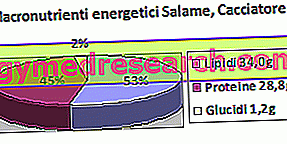Definition
Ovarian polycystic disease is known to most as polycystic ovary syndrome: it is an endocrine disorder characterized by cysts, enlarged and abnormal, located on the ovaries.
Causes
Polycystic ovary syndrome is the consequence of alterations in hormone levels, responsible, in turn, for a failed / incomplete development of Graafian follicles: the latter, healing, leave the cysts as a final result.
Hyperandrogenism → hirsutism → anovulation → menstrual disorders
Risk factors for polycystic ovary syndrome: diabetes, congenital adrenal hyperplasia, obesity, Cushing's syndrome, ovarian and adrenal cancers
Symptoms
Polycystic ovary syndrome is always characterized by: hyperandogenism, hirsutism, menstrual irregularity (oligomenorrhea), android obesity. Sometimes, the pathological condition is accompanied by: lowering of the voice, acne, alopecia, seborrhea. The most formidable complication is female infertility.
Diet and Nutrition
Information on drugs for the treatment of polycystic ovarian disease is not intended to replace the direct relationship between health professional and patient. Always consult your doctor and / or specialist before taking Medicines for the Treatment of Polycystic Ovary Syndrome.
drugs
Considering that obesity is a possible risk factor for polycystic ovary, a low-calorie and balanced diet is recommended. The drugs are able to decrease androgen overeproduction of the ovary (a goal also achieved through surgery in the event of failure to respond to drug treatment). Some drugs are aimed at increasing FSH hormone secretion; still others block the action of estrogens at the level of the membrane receptors. Let's look in more detail at the possible drugs used in therapy for the treatment of polycystic ovarian disease.
The following are the classes of drugs most used in the therapy against polycystic ovary syndrome, and some examples of pharmacological specialties; it is up to the doctor to choose the most suitable active ingredient and posology for the patient, based on the severity of the disease, the health of the patient and his response to treatment:
Contraceptive pill : administration of estrogen progestogen hormones
- Ethinyl estradiol / Levonorgestrel (eg Loette, Microgynon, Miranova, Egogyn): these are contraceptive pills useful for inhibiting the overproduction of gonadotropins, the main cause of the polycystic ovary manifestation. These drugs are available in packs of 21-28 tablets: each tablet consists of 0.02 mg of ethinyl estradiol and 0.1 mg of levonorgestrel. The pharmacological treatment involves taking one tablet a day, for 21 days, possibly at about the same time each day, followed by a free one-week interval.
- Desogestrel / Ethinyl estradiol (eg Gracial, Novynette, Lucille, Dueva, Securgin): these are coated tablets, with 20 mcg of ethnyl estradiol and 150 mcg of desogestrel. The dosage and method of administration reflects the one described above.
Progesterone derivatives : cyproterone (eg. Androcur, Diane, Visofid): blocks the action of estrogens at the level of the membrane receptors, improving the symptoms associated with polycystic ovary syndrome. The dosage and duration of treatment should be established by the doctor.
CLOMIFENE (eg. Clomid, Serophene): in the case of polycystic ovaries, the drug increases the secretion of the FSH hormone and helps the egg to mature and be released. The drug should be taken at a dose of 50 mg orally, once a day for 5 days. Therapy should be started on the fifth day after the start of menstruation; in the absence of uterine bleeding, consult your doctor. Clomiphene citrate is especially recommended for women who wish to conceive a child: in fact, the drug promotes ovulation.
Oral antidiabetics: since diabetes is one of the possible risk factors for polycystic ovary syndrome, the use of antidiabetic drugs can be a good solution.
- METFORMIN (eg Metforal): the treatment of polycystic ovary syndrome associated with hyperglycaemia guarantees a significant improvement in symptoms. It is recommended to take 500-850 mg of drug 2-3 times a day for the first two weeks of therapy; the maintenance treatment must be modified by the doctor, based on the values of the glycaemia. Do not exceed 3 g / day.
NB It is important to point out that in the case of obesity / overweight associated with polycystic ovary syndrome, the patient should follow a low-calorie and balanced diet, practice sports and take plenty of fluids.
Supplements
In the context of polycystic ovary syndrome, all those supplements and healthy eating habits, capable of increasing insulin sensitivity and normalizing blood sugar levels, can be an important dietary support, avoiding excessive peaks.
In particular, at nutraceutical level, good results have been obtained by administering myo-inositol-based supplements to women with polycystic ovarians, assisted by alpha-lipoic acid.



